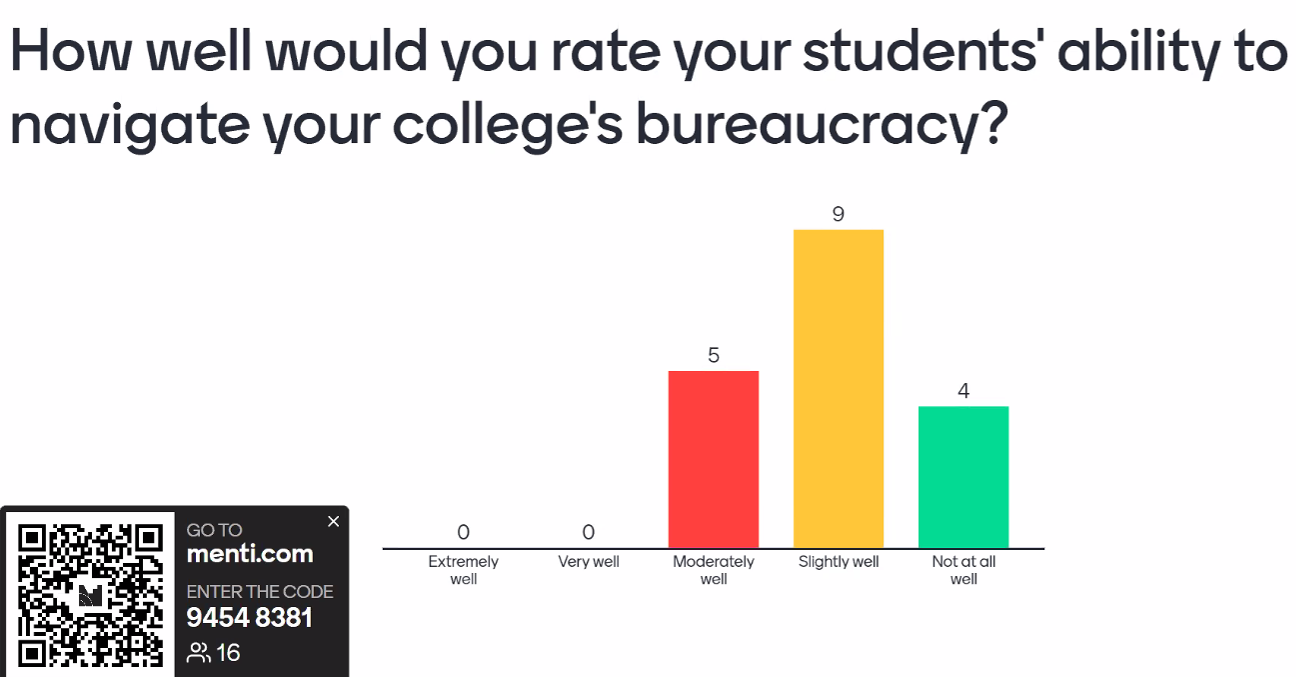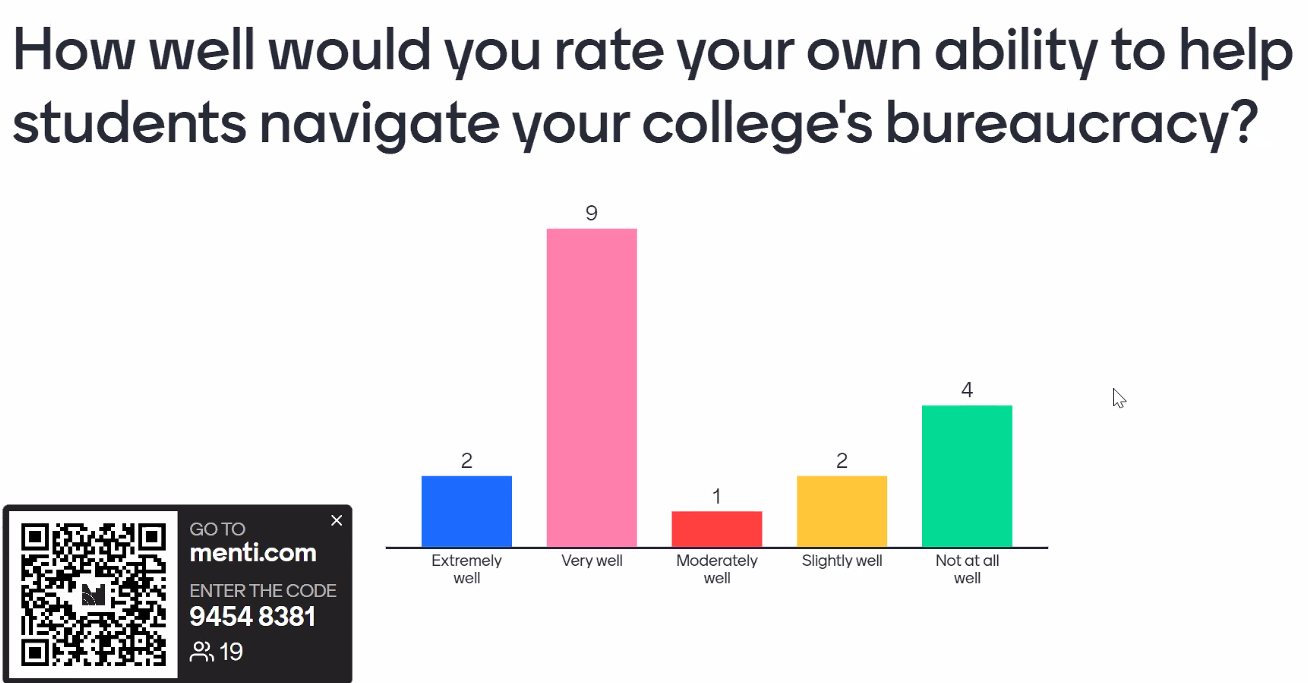Revisiting Student Success
Insights from the 2023 NISOD Fall Virtual Conference
The National Institute for Staff and Organizational Development (NISOD) hosts an annual fall virtual conference to bring together faculty, librarians, and student support services personnel to exchange best practices aimed at enhancing student success in community and technical colleges. The conference schedule focused on diversity, equity, and inclusion, holistic student supports, and teaching across different modalities. Sessions highlighted insights from faculty and staff across different departments on how to improve students’ educational experiences and equip them for success during their college years and in their post-graduate endeavors. As a first-time attendee, I closely followed sessions on serving students holistically. In this blog post, I share key takeaways and overarching themes from this year’s conference.
Holistic, Student-Centered Approaches
The majority of NISOD sessions highlighted the necessity of placing students and their holistic needs at the center of educational efforts by focusing on understanding students’ lived realities and future goals to prepare them for success. Students often face significant challenges in balancing their academic and personal lives, the costs of college, and addressing their basic needs. Therefore, it is crucial to account for students’ curricular and non-curricular needs and connect them to relevant resources, as navigating college and accessing resources and services can be challenging for many students.
In an interactive presentation, my colleague Melissa Blankstein and Borough of Manhattan Community College Open Knowledge Librarian jean amaral asked attendees to rate their students’ ability to navigate their college’s bureaucracy. Findings from in-session polling demonstrate that while many faculty and staff do not consider their students efficient navigators of their college’s bureaucracy, not all consider themselves to be efficient navigators of the same bureaucracy (Figure 1). The presentation highlighted the importance of enhancing college fluency and the critical role that collaboration and partnerships across different departments, including libraries, can play in addressing college fluency needs.
Figure 1. Break Bureaucratic Barriers Through College Fluency Collaborations! Presentation Slides


Sam DeZerga’s presentation about Early Alert Systems at Tallahassee Community College served as a compelling reminder of the critical need to promptly connect students to essential resources and support. DeZerga explained how these programs should effectively identify and intervene with students who face specific barriers to their academic success or display attrition-related behaviors, such as low academic performance, attendance issues, and experiencing basic needs insecurity. Successful implementation of these programs requires a dedicated team to assess effectiveness and progress, communicate with students properly using a non-deficit language approach, and provide consistent and personalized outreach to students in need. It is also crucial to ensure faculty involvement and administrative support to foster a sense of shared accountability for student success among all stakeholders.
Sessions also highlighted the existing perception gap between students’ career plans and employers’ expectations of college graduates. For instance, in a session titled, “A Voluntary Shadowing Experience: Helping Students Stay on Their Career Path,” Jeremy Carr of Central Alabama Community College, stressed that students should gain real-world exposure to their chosen careers in order to determine their true career interests and adjust them based on their experiences. Voluntary shadowing programs can be a promising approach to aligning students’ career choices with labor market trends. Moreover, Christine Harrington at Morgan State University called for comprehensive commitment to bolstering student career development in her keynote session, “A Campus-Wide Approach to Supporting Student Career Development.” When choosing a career path, students may feel overwhelmed by the vast number of majors, receive inconsistent and unreliable information about majors and careers, or not feel prepared to make potentially life-changing decisions. This can result in frequently changing majors, delaying graduation, incurring additional tuition costs, and losing potential income. With this in mind, higher education professionals should collaboratively create support systems for students to develop essential skills, build networks, and make informed career decisions.
Collaborative Efforts and Collective Responsibility for Student Success
In the first keynote, “Preparing Now for Next, Everyone Has a Role in Student Success,” President Michael Baston of Cuyahoga Community College discussed the challenges higher education institutions are facing, including inequities in access and learning, increasing financial constraints, and decreasing public confidence in higher education with diminishing importance of traditional degrees. His keynote emphasized how community colleges must adapt to the changing landscape of higher education and pay close attention to student expectations to ensure students and their institutions continue to thrive (Figure 2).
Figure 2. Preparing Now for Next, Everyone Has a Role in Student Success Presentation Slide

Considering the ever-evolving nature of higher education, it is vital to detect areas where student affairs professionals may need ongoing development. In their session “Elevating Student Affairs Personnel: Leaders’ Insights and Practical Implications,” Jill Channing and Kelly Mitchell from East Tennessee State University encouraged professional development in student affairs, focusing on building skills in communication, supervision, leadership, problem-solving, and ethical frameworks. Such training can provide the personnel with a thorough comprehension of their professional roles and responsibilities and enable them to collaborate effectively and adeptly navigate workplace conflicts.
Conferences such as NISOD create valuable opportunities for higher education professionals to share insights and experiences and build a sense of community in the pursuit of supporting equity and student success. Many sessions called for greater shared responsibility to improve the student experience, which could result in better student outcomes and the continued advancement of higher education. This collective mission seeks to empower students, educators, and communities to promote student success and enhance the overall educational experience.